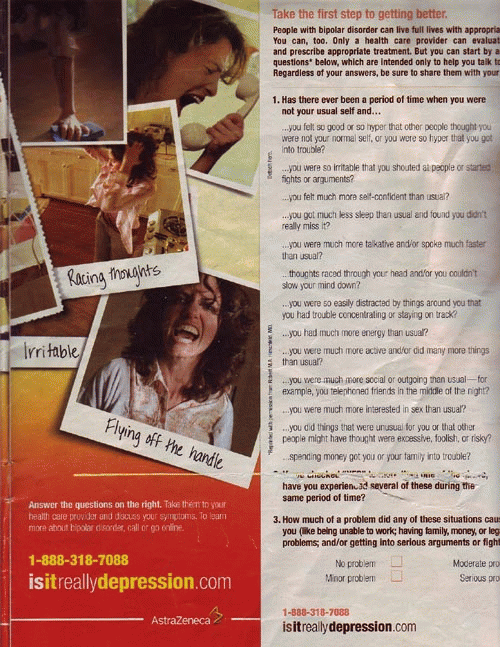What is more unknown is why drug ads that sow hypochondria, raise health fears and "sell" diseases are often the most common--and effective--even when the drugs themselves are of questionable safety.
Cymbalta ads were the nation's fourth most frequent drug ads in 2009 making Eli Lilly $3.1 billion in one year, despite the antidepressant's links to liver problems and suicide. Pfizer spent $157 million advertising Lyrica for fibromyalgia in 2009, despite the seizure pill's links to life threatening, allergic reactions. The same year, it spent $107 million advertising the antidepressant Pristiq even though it also had links to liver problems.
Before direct-to-consumer advertising, which began in 1999, ads which "sold" diseases said to afflict normal people were rampant, often casting women, children, the elderly and mentally ill in a bad light. Today, the ads still cast women, children, the elderly and mentally ill in a bad light--except that now they are targeted at us instead of doctors!
You-Are-Sick Ads
When psychiatric drugs first became popular for use in the general population, in the late 1960s, everyday personality problems became imbued with psychiatric labels. "Lady, your anxiety is showing (over a coexisting depression)," says a 1970 ad, showing an older, wrinkly woman in a bouffant wig with gigantic sunglasses and garish jewelry. "On the visible level, this middle-aged patient dresses to look too young, exhibits a tense, continuous smile and may have bitten nails or overplucked eyebrows," says the ad copy. "What doesn't show as clearly is the coexisting depression." The ad, both sexist and ageist, suggests the woman needs the antidepressant and tranquillizer Triavil.
Another ad from 1968 shows a bored, upper middle class couple whose hauteur is also said to really be depression. "Do you have patients who try to hide frustration behind conformity?" says the ad for the antidepressant Aventyl HCl.
You'd think such demeaning ads would vanish with DTC advertising because people would be offended. But You're Sicker-Than-You-Think ads are alive and well since DTC advertising and even flowering.
A three-page consumer ad in the late 2000s similarly conveys that everyday psychological traits could actually be dire mental problems that require medication. If you are "talking too fast," "spending out of control," "sleeping less," "flying off the handle" and "buying things you don't need," you could be suffering from bipolar disorder said the ads, which appeared in magazines like People. And here you thought it was the coffee. Accompanying photos of a woman screaming into a phone and contorting her face are so extreme they could come out of the movie Halloween Part II, if the woman were holding a knife.
Psychiatric drugs are not just advertised for every day personality problems. Pharma is pushing them for everyday pain conditions. Eli Lilly's original depression campaign for the antidepressant Cymbalta, "Depression Hurts," seems to anticipate its subsequent approval for pain conditions including back problems. Now ads tout Cymbalta as a "non-narcotic, once daily analgesic FDA approved for 3 indications across 4 different chronic pain conditions," as if it does not have severe controversial psychiatric risks including the suicide of volunteers who tested it.
And seizure and epilepsy drugs, known for major allergic and psychiatric reactions, are also becoming pain franchises. "What's causing your chronic widespread muscle pain?" asks an ad for the seizure and epilepsy drug Lyrica. "The answer may be overactive nerves," says the ad even though "widespread muscle pain" and "over-active nerves," are not mentioned in the approved labeling for Lyrica, says pharmaceutical reporter John Mack.
The military spent $35 million on seizure and epilepsy drugs in 2009 alone, including for migraines, headaches and pain.
And speaking of overkill, ads for genetically-engineered injected drugs like Humira, approved to treat serious diseases like Crohn's disease, psoriatic arthritis and chronic plaque psoriasis look like they are designed to sell beer or beauty treatments not immune suppressing drugs that invite cancers and lethal infections.
DTC ads don't just escalate everyday problems into psychiatric problems, they also escalate real psychiatric problems into irresponsible, sensationalistic stereotypes. Ads for the best selling antipsychotic Risperdal, widely used in children, and in soldiers with PTSD, suggest that people with mental illness have hallucinatory fears about "boiling rain" and "dog women." The "dog woman" ad, showing a half dog, half woman crouched on her elbows, her eyes blackened, furthers the sensationalizing of mental illness with the tag line, "Because Relapses Are A Living Nightmare."
Your-Kid-is-Sick Ads
Long before Pharma convinced parents, teachers and clinicians that millions of US kids had Attention Deficit Hyperactivity Disorder (ADHD), kids were said to suffer from "Minimal Brain Dysfunction" (MBD) and "Hyperkinesis" two conditions that were essentially the same as ADHD. In fact, so many kids had MBD by 1976, an ad for the drug Cylert hailed the "Importance of single daily dose to the child, the parents and the teacher," because kids wouldn't have to be singled out anymore at pill time at school. (ADHD has been so huckstered, a YMCA ad spoofs it with the headline, "Before Video Games, Before Facebook, Before Ritalin, There Was Basketball.")
Yet neither Cylert--whose approval the FDA withdrew in 2005 because of liver failure and deaths--or the current ADHD drugs are safe. In 2009, researchers reported that kids are more likely to die sudden deaths on them and the American Heart Association recommends electrocardiograms (ECGs) before kids take them. And yet, combined sales of ADHD drugs continue to grow from $4.05 billion to $7.42 billion in 2010.
(Note: You can view every article as one long page if you sign up as an Advocate Member, or higher).






